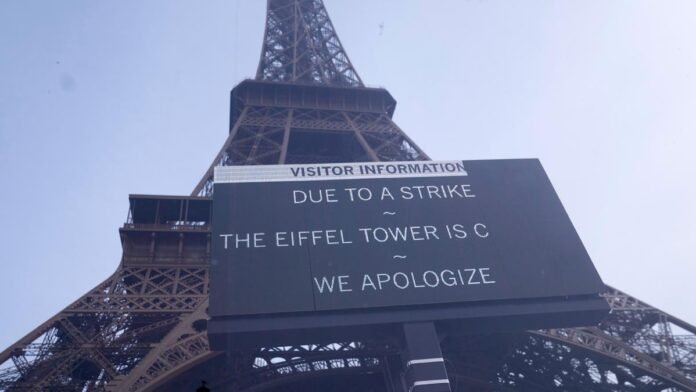Protesters took to the streets of more than 200 towns and cities across France on Thursday, October 2, 2025, voicing strong opposition to austerity measures and demanding higher taxes on the wealthy.
In Paris, thousands of workers, retirees, and students marched from Place d’Italie in the afternoon. The Eiffel Tower closed its doors to visitors due to the strike, underscoring the scale of disruption.
The strike, organized by France’s major unions, marked the latest in a wave of demonstrations sparked last month amid political instability and fierce debates over the draft budget.
Union members carried red CGT flags and banners, marching alongside a giant CGT balloon with the Eiffel Tower looming in the background. Demonstrators chanted slogans against cuts to welfare and social spending.
Prime Minister Sébastien Lecornu, appointed just last month, has yet to reveal his full budget plan. His government is still in formation, with ministerial appointments expected soon. Parliament is set to debate the bill later this year.
Sophie Binet, head of the CGT union, said the scale of demonstrations reflected public frustration. “It’s the first time we’ve had three days of strikes in a month without a government or budget. It shows the level of social anger,” she said on BFM TV.
Interior Ministry figures reported 85,000 protesters outside Paris by midday, though turnout appeared lower than in September. Unions, however, argued participation remained strong, pointing to widespread discontent.
Public transport saw mixed impact. High-speed trains continued largely unaffected, though some regional rail services faced disruption. In Paris, metro services ran close to normal, but commuter trains were reduced.
Several teachers and healthcare workers also joined the strike, adding pressure to sectors already under strain. Still, authorities noted smaller crowds compared to September 18, when more than half a million marched nationwide.
The September protests were marked by fiery barricades, tear gas clashes, and the “Block Everything” campaign, which brought parts of the country to a standstill. Thursday’s demonstrations, while calmer, reflected ongoing tensions between unions and the government.
Union leaders warned that further actions could follow unless the government scraps plans to freeze social benefits and introduce austerity cuts. They argue such measures would worsen living conditions for middle- and low-income families already battling inflation.
As budget negotiations loom, the strikes highlight the challenge facing Lecornu: reconciling France’s fiscal pressures with mounting public anger. Whether the government chooses compromise or confrontation will determine the course of France’s turbulent autumn.
